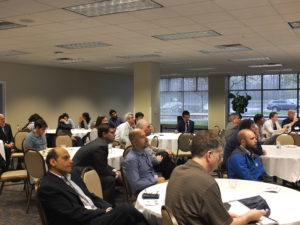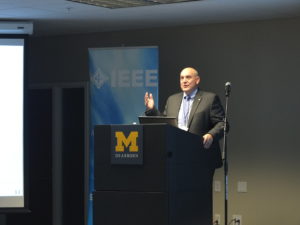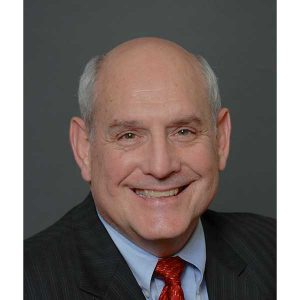2019 IEEE SEM Spring Conference
The Next Big Thing
Register for this event at https://events.vtools.ieee.org/m/191793
May 2, 2019
U of M Dearborn
Fairlane Center North
19000 Hubbard Dr
Dearborn, Michigan
SPONSORSHIP OPPORTUNITIES
We are always looking to join hands with industry and university partners in planning our Section conferences and offer a number of discounts and promotional opportunities. If your university, organization or corporation are interested in sponsoring our next event, please contact the conference planning team: SEMConference@ieee-sem.org
| TIME | Room | EVENT | SPEAKER |
| 3:30 PM – 4:00 PM | Main | Registration | |
| 4:00 PM – 4:15 PM | Main | Welcome and Opening Remarks | Larry Baczkowski |
| 4:15 PM – 5:00 PM | 111 | Analysis of Deep Learning Accuracy in Computer Vision Systems | Dr. Sarhan & Mr. Hamandi |
| 4:15 PM – 5:00 PM | 110 | Predict the New Communication Bus for Future Vehicles | Dr. Ganesan |
| 4:15 PM – 5:00 PM | Main | Classification of Noisy Multidimensional Images using Deep Learning | Dr. Jindal |
| 5:00 PM – 5:15 PM | All | Break | |
| 5:15 PM – 6:00 PM | Main | Quantum Computing | Dr. Ghose |
| 5:15 PM – 6:00 PM | 110 | Artificial Intelligence and Machine Learning: Identifying Legal Risks in Design | J. Dukarski |
| 5:15 PM – 6:00 PM | 111 | Towards Energy-Adapted Video Streaming | Dr. Sarhan & Mr. Hani & Mr. Alhabsy |
| 6:00 PM – 7:00 PM | Main | Dinner and Awards | |
| 7:00 PM – 7:45 PM | Main | KEYNOTE ADDRESS:
Sustaining the Next Big Thing in the Auto Industry |
Doug Patton |
| 7:45 PM – 8:00 PM | Closing Remarks/Adjourn | Sharan Kalwani |
Keynote: Sustaining the Next Big Thing in the Auto Industry
While everyone is moving past the automotive industry for the Next Big Thing the current ones have not succeeded yet. Things like automation and electrification still need big things to happen to be sustainable in broad market applications. As we look at the automotive space I will share what has maybe passed and what the Next Big Thing that are still needed.
Keynote Speaker Presentation by Doug Patton – Senior Technical advisor at DENSO International America, Inc. (DIAM), and senior director of DENSO Corp
Doug Patton is Senior Technical advisor at DENSO International America, Inc. (DIAM), and senior director of DENSO Corp. Located at DENSO’s North American headquarters in Southfield, Michigan, he provides input and support on all aspects of R&D in North America. In his previous position as Executive Vice President Engineering and CTO he oversaw all North American product engineering and development, campus facilities and operations including all testing and technical services, and Engineering Administration.
He was responsible for climate control, engine components, and systems and components, engine electrical, safety products, cluster, in-vehicle-infotainment (IVI) and body electronics and small motor engineering.
Doug Patton earned a Bachelor of Science degree in Electrical Engineering in 1977 and a Master of Business Administration degree in 1984, both from Bradley University in Peoria, Illinois.
He serves as president of the DENSO Foundation Board, is on the Board of Directors for the Engineering Society of Detroit (currently past president), and is also a member of the SAE, where he was the 2017 president. He is also an Engineering Society of Detroit Fellow.
Doug Patton is a member of the Detroit Economic Club, Lawrence Technological University’s College of Engineering Advisory Board, the Engineering Advisory Council of Kettering University and the Executive Leadership Team of the North American International Powertrain Conference.
Analysis of Deep Learning Accuracy in Computer Vision Systems
Deep learning is used to enhance the detection accuracy of threats, subjects, and/or objects in computer vision systems, such as automated video surveillance. The achieved accuracy depends on the capturing and encoding video parameters. In this talk, we discuss our recent work on the analysis of video adaptation strategies in terms of the achieved deep learning accuracy.
Nabil J. Sarhan, Ph. D Dept. of Electrical & Computer Engineering Director, Wayne State Multimedia Computing & Networking Research Lab Wayne State University
He is an Associate Professor of Electrical and Computer Engineering at Wayne State University and the Director of Wayne State Multimedia Computing and Networking Research Laboratory. He served as the Graduate Program Director of Electrical and Computer Engineering and the College of Engineering Faculty Assembly. Dr. Sarhan received the Ph.D. and M.S. degrees in Computer Science and Engineering at the Pennsylvania State University and the B.S. degree in Electrical Engineering at Jordan University of Science and Technology.
Hayder Hamandi is a PhD candidate of Computer Engineering at Wayne State University. He is also a Graduate Student Assistant in the Electrical and Computer Engineering department. He received an M.S degree in Electrical Engineering from the same department. His research interests include computer vision, deep learning, and video adaptation.
Predict the New Communication Bus for Future Vehicles
Subramaniam Ganesan, Ph. D Prof, Dept of Computer Science and Engineering Oakland University
ADAS, V2V, internet, cloud and OTA (over the air) software updates etc., demand higher communication speed to meet real time need, security, and reliability. This presentation will cover the following topics. The current Communication buses in automotive are CAN, LIN, MOST, FlexRay, Ethernet, CAN Flex Data, Blue tooth, Wi-Fi etc.
Security against hacking is a must and the design should include Gateways, Hardware and software techniques to provide protection. Electromagnetic Radiation from an electrical bus increases with changed voltage from a 12 to 48 Volt battery.
The current technology: Multi-Core, FPGA, SOC – suggest that central computing instead of distributed computing for new devices. Also software bugs cost a lot for the manufacturer. Software validation and verification are important, thus for Embedded Systems this includes: task deadlines simulation, measurement and testing using software in the loop (SiL) and hardware in the loop (HiL) are a must. Use of real time operating systems (RTOS) for reliable design and meeting various standards like SAE 26262, are to be considered. Future buses for hybrid and fully electric vehicles need a new approach & design.
Dr. Subramaniam Ganesan, is a Professor in the Department of Computer Science and Engineering, Oakland University, Rochester, MI 48309, USA. He has over 25 years of teaching and research experience in Digital Systems. He was the chair of the department from 1991 to 1998. He received his Masters and PhD from the Indian Institute of Science, Bangalore, India. He worked at National Aeronautical Laboratory, India, Ruhr University, Germany, Concordia University, Canada and Western Michigan University before joining Oakland University. He has published over 35 journal papers, 100 papers in conference proceedings and 3 books. He is a Life member of IEEE, IEEE Computer Society Distinguished Visiting Speaker, member of ACM and council member of ISPE.
Towards Energy-Adapted Video Streaming
With Dynamic Adaptive Streaming over HTTP (DASH), videos are stored with different levels of quality and users dynamically switch to the appropriate quality level based on the current experienced network conditions. In this talk, we discuss our recent work on adapting the bit rates based on energy constraints as well as the experienced network conditions.
Nabil J. Sarhan, Ph. D Dept. of Electrical & Computer Engineering Director, Wayne State Multimedia Computing & Networking Research Lab Wayne State University
Ahmad Bani Hani PhD candidate of Computer Engineering at Wayne State University. His research interests include video streaming, DASH, and energy modeling.
Emad Alhabsy is a PhD candidate of Computer Engineering at Wayne State University. He received an M.S degree in Electrical Engineering from the same department. His research interests include video streaming, DASH, and energy modeling.
Quantum Computing
The brave new world of quantum computing – and how we should approach it”
Shohini Ghose explores the strange quantum world of atoms and photons to understand the fundamental laws of the universe and harness them for quantum computing and communication — and works to make science accessible and inclusive for people of all genders and backgrounds.
Shohini Ghose is an Associate Professor of Physics and Computer Science and Director of the Centre for Women in Science at Wilfrid Laurier University in Waterloo, Canada. She is a theoretical physicist who examines how the laws of quantum physics might be harnessed to transform computation and communication, and to develop novel protocols such as teleportation. Her research has been published in Nature and has received worldwide media attention. She was recently awarded a prestigious Sera Bangali Prize for her contributions to science.
Shohini is also a passionate educator and recently co-authored Canada’s first introductory astronomy textbook. The activist in her questions why only two women have ever won the Nobel Prize in physics, and she is passionate about addressing gender issues in science. She recently founded the Laurier Centre for Women in Science (WinS), with the mission of building a strong community for women in science through research, communication and action. The Centre supports and celebrates the contributions of women scientists, and also supports research and initiatives addressing challenges faced by women in science. Shohini is an affiliate of the Perimeter Institute for Theoretical Physics and the Institute for Quantum Computing at the University of Waterloo.
Artificial Intelligence and Machine Learning: Identifying Legal Risks in Design
Through the wonder of artificial intelligence and its many branches, including machine learning, we have been able to allow computers to obtain and apply knowledge without being explicitly programmed in a conventional manner. These technologies will likely enable revolutionary advances in autonomous systems, healthcare diagnostics, and personal devices. Implementing these technologies, however, will face a host of challenges in the design and validation cycle.
Join us as we discuss the factors that engineers impact and lawyers debate including: the utility of AI and machine learning to the public as a whole, the likelihood of injuries created by AI decision making, the level of safety found in an AI approach, the functionality and affordability of AI solutions, and an engineer’s ability to help a product manufacturer spread the cost of safety when adopting AI and Machine Learning in design.
Jennifer Dukarski is a Shareholder based in Butzel Long’s Ann Arbor office, practicing in the areas of intellectual property, media and technology. She focuses her practice at the intersection of technology and communications with an emphasis on the legal issues arising from emerging and disruptive innovation: vehicle safety, connected and autonomous cars, data privacy and security, patient portals and telehealth, infotainment, and mobile apps. With experience in intellectual property, automotive and media law, she leads clients in securing and protecting technology through transactions and litigation.
Ms. Dukarski is a graduate of the University of Detroit Mercy School of Law (J.D., magna cum laude, 2010). Her honors include the Frank Murphy Honor Society Member and the Denise Ilitch Scholarship Award. She was an Associate Editor at the University of Detroit Mercy Law Review and the Executive Director of the Moot Court Board of Advocates where she won the National Championship at the inaugural National Moot Court Invitational Tournament.
Classification of Noisy Multidimensional Images using Deep Learning
Deep Neural Networks (DNNs) have led to significant advances in the fields of computer vision, speech processing, and natural language processing. The outstanding performance of Deep learning approaches depends on the availability of a massive amount of clean and correctly labeled datasets. This talk aims to provide an overview of machine learning methods and Deep Neural Networks to learn effective and meaningful data representations. Finally, I will present an efficient approach to make Deep Neural Networks robust to erroneous and corrupted training labels. This approach jointly learns the label noise statistics and encourages the Deep Neural Network to learn meaningful data representations for image and text data.
Ishan Jindal, PhD received his Doctorate from Wayne State University Detroit MI in 2019. He completed his M.Tech degree with distinction from Indian Institute of Technology Roorkee, India in 2014. He was awarded DAAD Fellowship for completing his Masters at TU Berlin, Germany. He joined Indian Institute of Technology Gandhinagar, India as a Junior Research Fellow from 2014 to 2015. His research interests include machine learning and data mining, deep neural networks and signal processing.














